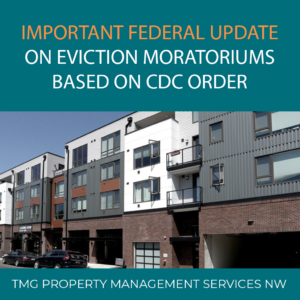Introduction
On September 1, 2020, the Department of Health and Human Services (HHS) Centers for Disease Control and Prevention (CDC) issued an Agency Order halting residential evictions through December 31, 2020.
The Order is replete with legalese and is therefore a bit complex. The purpose of this lecture handout is to translate much of the Order into Plain English and to weed out repetitive sections. Stated more poignantly, this lecture handout provides a summary overview of the Order. It is neither detailed nor a suitable replacement for a focused reading of the Order. In fact it’s overly simplistic. Still, this handout will provide readers with a solid framework for reading, understanding, and assimilating the Order.
After you’ve read this lecture handout… read the Order. Also, follow the news: No one yet knows if the Order is legally enforceable.
What the Order Does
The Order prohibits residential landlords and any other person with a right to evict tenants from evicting tenants through the effective period (ending December 31, 2020).
For purposes of the Order, “person” includes corporations, companies, associations, firms, partnerships, societies, and joint stock companies, as well as individuals.
Excluded Regions
The Order does not apply in any state, local, territorial, or tribal area with a moratorium on residential evictions that provides the same or greater level of public-health protection than the requirements listed in this Order. Nor does this order apply to American Samoa, which has reported no cases of COVID-19, until such time as cases are reported.
Regions Are Allowed to be More Strict Than the CDC Order
The Order does not preclude state, local, territorial, and tribal authorities from imposing additional requirements that provide greater public-health protection and are more restrictive than the requirements in the Order.
Tenant’s Obligations Still Exist
Tenants are still obligated to pay rent, make housing payments, or comply with any other obligation that the individual may have under a tenancy, lease, or similar contract.
The Order has no effect on the contractual obligations tenants have to their landlords. It does not preclude landlords from charging or collecting fees, penalties, or interest as a result of the failure to pay rent or other housing payment on a timely basis, under the terms of any applicable contract.
Tenant’s Declaration Required
In order to invoke their rights, Tenants who fall under the Order must provide an executed copy of the Declaration form shown in attachment A (or a similar declaration under penalty of perjury) to their landlord, owner of the residential property where they live, or other person who has a right to have them evicted or removed from where they live. Each adult listed on the lease, rental agreement, or housing contract should likewise complete and provide a declaration. View Declaration Here.
Once the Declaration is correctly submitted, landlords can’t evict or remove the tenants through December 31, 2020. However, the tenants must still pay rent and comply with the lease and related rules.
What the Declaration Must Indicate
The Declaration must declare, under penalty of perjury, that:
- Best Efforts Made to Obtain Assistance: “The individual has used best efforts to obtain all available government assistance for rent or housing;”
- Income Threshold: “The individual either (i) expects to earn no more than $99,000 in annual income for Calendar Year 2020 (or no more than $198,000 if filing a joint tax return),6 (ii) was not required to report any income in 2019 to the U.S. Internal Revenue Service, or (iii) received an Economic Impact Payment (stimulus check) pursuant to Section 2201 of the CARES Act;”
- Reason for Inability to Pay Rent: “The individual is unable to pay the full rent or make a full housing payment due to substantial loss of household income, loss of compensable hours of work or wages, a lay-off, or extraordinary7 out-of-pocket medical expenses;”
- Best Efforts to Make Partial Payments: “The individual is using best efforts to make timely partial payments that are as close to the full payment as the individual’s circumstances may permit, taking into account other nondiscretionary expenses; and”
- Results of Eviction: “Eviction would likely render the individual homeless—or force the individual to move into and live in close quarters in a new congregate or shared living setting—because the individual has no other available housing ”
Evictions Still Allowed For Reasons Other Than Nonpayment of Rent
Landlords can still evict tenants for reasons other than not paying rent or making a housing payment. Under “Applicability,” the Order expressly does not preclude evictions if the tenants are…
- Engaging in criminal activity while on the premises;
- Threatening the health or safety of other residents;
- Damaging or posing an immediate and significant risk of damage to property;
- Violating any applicable building code, health ordinance, or similar regulation relating to health and safety; or
- Violating any other contractual obligation, other than the timely payment of rent or similar housing-related payment (including non-payment or late payment of fees, penalties, or interest).
Savings and Severability Clause
The Order does contain a savings and severability clause, as follows: “If any provision of this Order, or the application of any provision to any persons, entities, or circumstances, shall be held invalid, the remainder of the provisions, or the application of such provisions to any persons, entities, or circumstances other than those to which it is held invalid, shall remain valid and in effect.”
Head Scratchers
As with all eviction moratoriums we’ve seen over the course of the past many months, ambiguities exist. This latest Order may prohibit No Cause and Non-renewal Notices, may encompass Oregon’s 90-Day Notice exceptions to prohibitions against No Cause and Non-renewal Notices, and so on. However, the Order is new and untested, so deeper readings and/or judicial interpretations may be required before the Order is more fully understood.
Criminal Penalties
A variety of criminal sanctions exist.
“A person violating this Order may be subject to a fine of no more than $100,000 if the violation does not result in a death or one year in jail, or both, or a fine of no more than $250,000 if the violation results in a death or one year in jail, or both, or as otherwise provided by law.”
“An organization violating this Order may be subject to a fine of no more than $200,000 per event if the violation does not result in a death or $500,000 per event if the violation results in a death or as otherwise provided by law. The U.S. Department of Justice may initiate court proceedings as appropriate seeking imposition of these criminal penalties.”
Notice of Available Federal Resources
The Order contains a variety of notifications. For example, it (a) notifies cooperating state and local officials of the US Department of Health and Human Services’ ability to assist with the enforcement of health regulations and quarantine rules; (b) sets forth a variety of fiscal aid programs; and (c) lists websites containing valuable information. Here are three of the provided links:
https://www.hudexchange.info/program-support/
www.hud.gov/coronavirus
https://home.treasury.gov/policyissues/cares/state-and-local-governments
The Full Order
(As of September 1, 2020, Prior to Publication in the Federal Register)
The full Order was unveiled on September 1, 2020. Here’s a link: CDC Order - BILLING CODE: 4163-18-P
Technically speaking, the Order doesn’t take effect until it is published in the Federal Register. It may have been published on September 1, 2020, but no link was found on that date.
Read the full Order and do not rely upon this brief summary for legal guidance. This summary is merely designed to facilitate your understanding of the full Order when you read it.
Note: Summary by Jeffrey S. Bennett, Atty. at Law, partner at Portland Law Firm of Warren Allen LLP ; Summary regarding the Department of Health and Human Services CDC Order on the Temporary Halt in Residential Evictions to Prevent the Further Spread of COVID-19 (September 1, 2020).
About TMG Property Management Services NW
TMG Property Management Services NW is here to help you navigate through the changing tenancy laws and ordinances in Oregon and Washington. Rated as one of the top property management firms in the Portland Metro area by the Portland Business Journal, TMG leads the way in full-service property management across Oregon and Washington. TMG Property Management Services NW is a branch of the TMG Family of Companies and provides fully integrated property management, asset management, and leasing services to multifamily and single-family homes.
Call our new business team for a free consultation:





